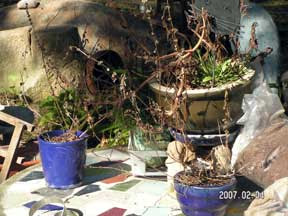
In olden days, book titles used to be informative, descriptive, and more flowery than a host of heavenly winged cherubs, tipping baskets of fragrant Valentine’s Day flowers, over the heads of naked pink, modestly entwined, Rubenesque lovers. This applied to books of fiction, e.g. “The Tragic Tale of the Kidnap, Violent Deflowering and Eventual Rescue of Rose Red: or, How Princess Red Learned to Close Her Eyes and Think of England”. This also applied to non-fiction.
In 1855, Kerby & Son, 190 Oxford St, London, published a book by MRS. LOUDON, AUTHOR OF: “THE LADIES’ COMPANION TO THE FLOWER GARDEN;” “GARDENING FOR LADIES,” ETC, with the descriptive title: “My Own Garden - THE YOUNG GARDENER’S YEARBOOK.”
Things seem to run on idyllically well at first:
“Almost all young people are fond of a garden; and as gardening is a fine healthy exercise, it is desirable to encourage a taste for it as much as possible: consequently there are few persons, I believe, who have a family, who, if they have any quantity of garden ground to themselves, do not set aside a small portion of it for their children….”
But very soon, it takes a darker turn. The author veers down into the exhaustively outlined ”, Book I: “January, February, and March.” Chapter 1: “Choosing the Ground; and Selecting Implements and Instruments” and her suddenly sinister voice regretfully informs us:
“The months of January and February count for very little in a garden. It is expecially (sic) quite impossible for any boy or girl to work in the open air when the ground is hard with frost, as it generally is in the month of January, or covered with snow as it often is in February.”
Now, it would be a relatively cheap shot to compare-and-contrast her distractingly exhaustive titles, and to conclude her message was an allegory-free fairy tale. But consider: she was intentionally sowing her moral lesson just short of too shallowly to germinate in her readers’ collective subconscious minds. Reread the sentence above and see it suddenly blossom into a metaphor of the trials and tribulations of the Young Gardeners’ coming lives as a brief metaphorical season.
But I believe Mrs. Loudon was much more crafty and subtle than one might credit her for. After all, she begins – rather than ends – with winter.
It’s almost as if those crafty titles are red herrings delicately pitched to fly beneath the radar of Victorian Manhood. Specifically: he that compelled her to sacrifice her given name, and sublimate it under her husband’s family name. All for the privilege of writing seemingly superficial gardening books to train her doomed successors.

In a book entitled rosily enough to deter even the gayest of their male contemporaries, Mrs. Loudon whispers this secret to the little girls – delivering it like a punch to the gut when they were expecting a gentle kiss:
"Philosophers say that there is no pleasure so great as that of conquering difficulties; but then the difficulties should be such as can be conquered without too great a waste of physical strength, or without bringing on that hopeless despondency which is the consequence of a constant struggle against difficulties which are too great to be surmounted”.
Be afraid, little girls. Perhaps you can cultivate a garden of sufficient interest to offset the torpor of life. Good luck with that. But, my lovelies, it’s a very dark ride. Kappy’s detachment might save you from the hopeless despondency. Women in my family who have inherited or cultivated detachment, seem able to stay on their feet, swaying and bending like young trees in a thunderstorm, but remaining upright. There’s nobility in the struggle.
Readers of today may find the parable hauntingly reminiscent of another oxymoronical rule: the one about trying not to dirty your soul with sin, while knowing it’s already incurably muddied by the sin committed by the Original Girl in the Original Garden. But if Mom and Mrs. Louden didn’t tell us, girls know that all gardeners get dirty. It’s some rule of the universe about how entropy corrupts every one and every thing. Grown Women don't just know about the dirt, we cultivate it.
Mrs. Loudon’s book at: http://books.google.com/books?vid=OCLC15181661&id=WFEDAAAAQAAJ&pg=RA1-PR4-IA1&lpg=RA1-PR4-IA1&dq=gardens+in+February#PPP11,M1 .
 I remember running three-legged races with Grandma, at my cousins’ house in the country, balancing eggs in teaspoons. I remember how Grandma wasn’t very good at it, and my twelve-year-old speed and balance kicked ass. These days, I can barely carry a full cup of coffee across the room without spilling some. I recently did the math, and realize that I’m older now than Grandma was when we last teamed up to race.
I remember running three-legged races with Grandma, at my cousins’ house in the country, balancing eggs in teaspoons. I remember how Grandma wasn’t very good at it, and my twelve-year-old speed and balance kicked ass. These days, I can barely carry a full cup of coffee across the room without spilling some. I recently did the math, and realize that I’m older now than Grandma was when we last teamed up to race.






